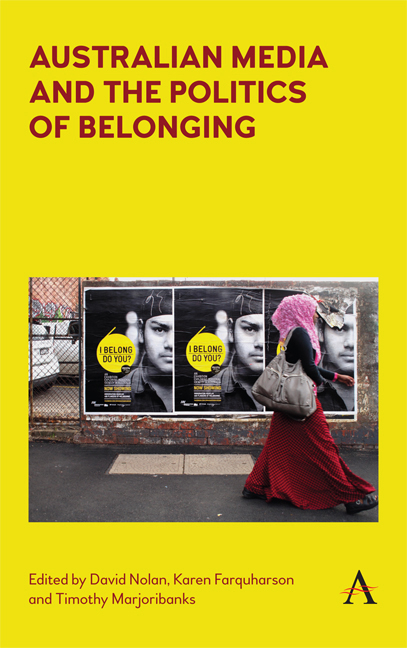Book contents
- Frontmatter
- Contents
- List of Illustrations
- Acknowledgements
- Part I THEORIZING BELONGING IN CONTEMPORARY AUSTRALIA
- Chapter 1 Australian Media and the Politics of Belonging
- Chapter 2 Politics of Belonging in a Mediated Society: A Contribution to the Conceptual Exegesis
- Chapter 3 Media, Belonging and Being Heard: Community Media and the Politics of Listening
- Part II SUDANESE AUSTRALIANS, MEDIA PRACTICES AND THE POLITICS OF BELONGING
- Part III SHIFTING THE POLITICS OF BELONGING: MEDIA INTERVENTIONS AND POSSIBILITIES FOR TRANSFORMATION
- Notes on Contributors
- Index
Chapter 3 - Media, Belonging and Being Heard: Community Media and the Politics of Listening
from Part I - THEORIZING BELONGING IN CONTEMPORARY AUSTRALIA
Published online by Cambridge University Press: 21 June 2018
- Frontmatter
- Contents
- List of Illustrations
- Acknowledgements
- Part I THEORIZING BELONGING IN CONTEMPORARY AUSTRALIA
- Chapter 1 Australian Media and the Politics of Belonging
- Chapter 2 Politics of Belonging in a Mediated Society: A Contribution to the Conceptual Exegesis
- Chapter 3 Media, Belonging and Being Heard: Community Media and the Politics of Listening
- Part II SUDANESE AUSTRALIANS, MEDIA PRACTICES AND THE POLITICS OF BELONGING
- Part III SHIFTING THE POLITICS OF BELONGING: MEDIA INTERVENTIONS AND POSSIBILITIES FOR TRANSFORMATION
- Notes on Contributors
- Index
Summary
Introduction
Media in all their forms play a complex and central role in the contested politics of belonging. Nowhere is this more evident than in Sydney's western suburbs, which for decades have been framed as Sydney's ‘other’ and featured at the centre of national debates on immigration and refugees, so- called ethnic crime and gangs, the ‘war on terror’ and global Islamophobia. The role of mainstream media in racializing and ‘othering’ the diverse communities of western Sydney is well established (Powell 1993; Collins et al. 2000; Poynting et al. 2004). The emerging scholarship on community or citizens media, in contrast, demonstrates their significant role in the politics of belonging in western Sydney (Salazar 2010; Ho 2013; Dreher 2012; Vanni 2014; Lloyd 2013). In this chapter, I analyse these dynamics with a focus on the politics of listening in addition to the more common emphasis on the politics of voice. The listening approach seeks to extend the analysis of community media and belonging beyond the celebration of individual empowerment and community voice, to also ask questions of receptivity, recognition and response.
The chapter is organized into three sections. The first section introduces western Sydney and the highly contested and mediated politics of belonging. Sydney's western suburbs and the communities associated with key locales have long been subject to mainstream media stereotypes of culture- less Westies, ethnic crime and, more recently, home- grown terrorism. These persistent narratives serve to marginalize and exclude. The following section analyses how diverse communities in western Sydney develop and mobilize narratives of belonging via community and alternative media projects. In particular, I focus on listening strategies developed by the innovative new media community arts organization Information + Cultural Exchange (ICE) to generate forms of individual and community- level belonging. The third section analyses the evidence for listening at the macro or social level – including participants’ own perceptions of being heard, shifting perceptions of western Sydney and possibilities for belonging in the creative industries. Here, the evidence for listening in response to the voices enabled by projects for speaking up and talking back is more mixed. The brief concluding discussion highlights the significance of media for a highly uneven politics of belonging around western Sydney.
- Type
- Chapter
- Information
- Australian media and the politics of belonging , pp. 37 - 60Publisher: Anthem PressPrint publication year: 2018

